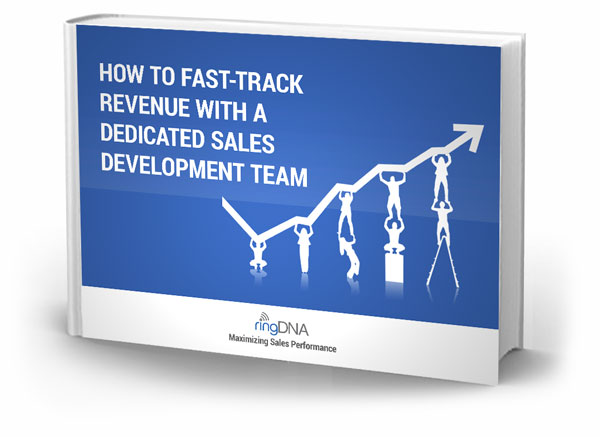11 Key Things You Must Know About B2B Leads Before You Call
Imagine you’re an inside sales rep who is given a list of outbound leads to call down. It can be tempting to just dial down the list cold, in hopes of initiating as many conversations as possible. But think how much more successful you could be if you had access to contextually relevant information about each lead.
You may be thinking, “Sounds great, but who has time for that?” You do, thanks to sales acceleration technology.
Whereas acquiring contextual data about prospects may have once been time-prohibitive, sales acceleration technology now makes it easier and quicker than ever to find out relevant details about prospects prior to reaching out. Our sales acceleration platform reveals vital information about prospects from Salesforce, marketing automation and social media platforms within the context of calls. Reps can therefore enjoy smarter conversations while minimizing the time they spend researching prospects.
Here are the five most important things B2B sales reps should know about prospects before reaching out.
Past Communications
The first thing that you need to know about a lead is whether another rep at your company has spoken to this prospect (or another prospect at their company) before. As long your reps are doing a good job of logging call details in Salesforce, it should be easy to access this information. However, the reality is that most companies don’t log enough call data in their CRM (if they’re logging call data at all). That’s why it can help to utilize a tool that automatically logs calls in Salesforce. And for really important leads, you may even want to take the time to drill down and listen to call recordings, if they’re available.
Marketing Automation Data
Even if there is no record of communications with a prospect, it doesn’t mean that they’re unfamiliar with your brand. If your company is using a marketing automation tool like Marketo, Eloqua or Pardot, you can keep a record of when a lead visited your site, what content they downloaded, which blog posts they read and which ads they clicked. This data is perhaps just as important for sales reps to see as marketers since it gives reps quick visibility into which offerings or messages resonate with a lead. For example, if a lead downloaded our eBook on optimizing sales voicemails I’d be sure to work the fact that Revenue.io helps reps maximize responses from sales voicemails into my pitch.
Company/Industry
If you don’t take the time to quickly discover what a prospect’s company does, you’re setting yourself up for failure. Before calling any prospect take a quick trip to their website and company page on LinkedIn. If their industry is completely alien to you, it can pay to do some quick research on Wikipedia or elsewhere to at least attempt to understand what their company does and how you can help them to do it better.
Career History
It can pay to look up a lead in LinkedIn. Knowing where a prospect has worked or has gone to school can help you establish common ground. I also like to see how long a prospect has been working at their company. Leads that are relatively new in their position often tend to be hot. New hires are often given a mandate to deliver changes and a budget to do so. Searching LinkedIn for possible mutual connection is also important. If you can get a referral, or even drop the name of a mutual acquaintance, it can vastly accelerate a deal.
Company News
Has your prospect’s company just closed a funding round, hired a new top executive, or been featured in a major publication? Showing your prospects that you’ve done your homework is a great way to not only position yourself as being knowledgeable, but.also win respect from prospects. I know that the smarter and informed a sales rep, the more likely I’ll be to want to buy from her.
 Want to learn more about accelerating your outbound sales efforts? Check out our eBook How to Fast-Track Revenue with a Dedicated Sales Development Team.
Want to learn more about accelerating your outbound sales efforts? Check out our eBook How to Fast-Track Revenue with a Dedicated Sales Development Team.
More on Preparing for B2B Prospecting Leads
Years ago, back when I was prospecting at another company, I remember cold calling a lead four or five times before finally getting her on the phone. When I finally did, I realized that I knew nothing about what her company did or even what her role was at that company. After asking some potentially intrusive questions, I discovered that she was the wrong decision maker to call.
I didn’t win the deal because I didn’t have the information I needed to win the deal. I realized then and there that one of the best cold calling tips is knowing something about a prospect is a heck of a lot better than knowing nothing at all.
 Are your inside sales reps still cold calling prospects? If so, it might be time to reexamine your prospecting strategy. Unless you’re selling insurance or something else that has a quick, one-size-fits-all value prop, it pays to know more about prospects than their names. By quickly gathering a bit of data on target prospects and accounts, reps can do a far better job of building lead lists, qualifying leads, identifying key decision makers and having meaningful conversations.
Are your inside sales reps still cold calling prospects? If so, it might be time to reexamine your prospecting strategy. Unless you’re selling insurance or something else that has a quick, one-size-fits-all value prop, it pays to know more about prospects than their names. By quickly gathering a bit of data on target prospects and accounts, reps can do a far better job of building lead lists, qualifying leads, identifying key decision makers and having meaningful conversations.
There are several things about prospects that—whenever possible—you should learn about prospects before contacting them. Here are 6 common facts I like to know about prospects prior to reaching out.
Time Zone
4:30 pm can be a great time to call B2B C-level prospects. By then, they’ve often finished their daily grind and are open to chatting about new opportunities. But when it’s 4:30 p.m. here in California, it’s 7:30 p.m. in New York. By 7:30 p.m., most prospects that aren’t complete workaholics are busy having dinner with their families. That’s why you need to know your prospects’ time zone. If I know a prospect is located in New York, I’d can make sure to reach out to them at 4:30 their time. Knowing prospects’ time zone also helps me do a better job of prioritizing when to reach out to each new prospect. Revenue.io’s Intelligent Dialer includes a time zone detection feature that automatically captures and displays the local time of the prospect from the area code.
Contact/ Purchase History
Before calling a prospect, check Salesforce to see whether their company has done business with yours before. If they have, it is often a lot easier to keep the prospect on the line or get a call back. It’s likewise important to know whether other reps at your company have reached out to this contact before. If so, there may be some helpful info in Salesforce Chatter or the lead notes field.
Company Revenue
Knowing a company’s overall revenue can help you idfentify whether they could potentially have budget for your solutions. As an example, if you’re selling high price tag enterprise solutions and their revenue is in the six figures, their company may not be the right fit for your solutions. This is data that can often be obtained from sources like Dun and Bradstreet (D&B).
Company Funding History
Before dialing a prospect, I like to get a brief overview of their company’s funding history, as getting funding is an important trigger event. As an example, say a target SaaS company just closed a 50 million dollar series B round, this can indicate that they may have a budget to spend on your solutions where they didn’t previously. Sites like AngelList and Crunchbase.
Job History
Newly hired executives are often not only given a mandate for change, but also a budget to bring changes to fruition. It is often prudent, when list building, to target prospects that have recently changed jobs. This information is often freely available on LinkedIn.
Industry
This is going to sound like common sense, but simply taking the time to identify and briefly research a prospect’s industry before calling can give you a powerful advantage over sales reps that cold call without this knowledge. Tailoring your sales pitch to their industry-specific pain points can really make the difference between getting a second meeting and getting a “thanks, but no thanks.” This is one of the reasons I routinely advocate that reps target specific industry verticals.
When you do get the right decision maker on the phone, here are 21 questions that you can ask to help you qualify them and bring them to a buying decision faster!
